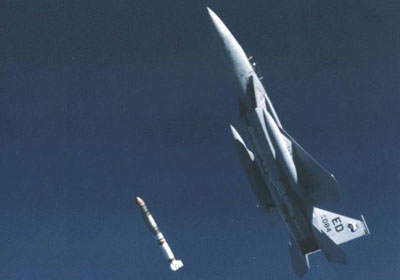
In a related story, after the ESA grudgingly admitted Red China's involvement in it's development, the Galileo satellite mysteriously disappeared from radar shortly after achieving its orbital destination.
Posted on 12/28/2005 11:57:41 AM PST by Jordi
MOSCOW, Dec 28 (Reuters) - The European Union launched its first Galileo navigation satellite on Wednesday, moving to challenge the United States' Global Positioning System (GPS).
Russian space agency Roskosmos said the 600 kg (1,300 lb) satellite named Giove-A (Galileo In-Orbit Validation Element) went into its orbit 23,000 km (15,000 miles) from the earth after its launch on a Soyuz rocket from the Baikonur cosmodrome in the middle of Kazakhstan's steppe.
"The launch of Giove is the proof that Europe can deliver ambitious projects to the benefit of its citizens and companies," said EU Transport Commissioner Jacques Barrot in a statement.
The 3.6 billion-euro ($4.27-billion) Galileo programme, due to go into service in 2008 and eventually deploy 30 satellites, may end Europe's reliance on the GPS and offer a commercial alternative to the GPS system run by the U.S. military.
"Radio-navigation based on Galileo will be a feature of everyday life, helping to avoid traffic jams and tracking dangerous cargos," Barrot said.
The GPS is currently the only worldwide system offering services ranging from driver assistance to search-and-rescue help. Critics say its services for civilians offer less precision than those for military or intelligence purposes.
Galileo's accuracy in positioning is to be one metre (3 feet) or less, while the GPS's precision is more than 5 metres.
EU officials also say Galileo would never be switched off for strategic reasons, which might be the case with the GPS.
If successful, the satellite will mark a major step in Europe's biggest ever space programme, involving firms such as European aerospace giant EADS, France's Thales (TCFP.PA: Quote, Profile, Research) and Alcatel (CGEP.PA: Quote, Profile, Research) , Britain's Inmarsat (ISAT.L: Quote, Profile, Research) , Italy's Finmeccanica (SIFI.MI: Quote, Profile, Research) and Spain's AENA and Hispasat.
SYMBOL OF SUCCESS?
Galileo's critics say it is an unnecessary exercise in political grandeur, which is unlikely to be commercially viable, as GPS is free of charge and will soon be upgraded.
But advocates point to its future role in Europe's new air-traffic system and plans to integrate it with mobile telephone services, which should provide ample business opportunities.
Like aircraft Airbus, Galileo could be become a symbol of success that Europe needs at a time of economic stagnation of political rifts.
The system will be organised as a public-private partnership, with the Commission wanting two-thirds of the funding to come from industry and the rest from public coffers.
Galileo, which is developed with the help of several non-European countries including Ukraine, Israel and China, will create about 140,000 jobs in Europe, EU officials say.
The European Union and the United States clinched a deal last year on making Galileo compatible with the GPS.
Washington had been initially unhappy about Galileo, saying it could pose a potential security threat as its signals could interfere with those of the next-generation GPS.
The Giove-A satellite will test key new technologies such as on-board atomic clocks, signal generators and user receivers. The second, Giove-B satellite is to be launched in the spring. (Additional reporting by Marcin Grajewski in Brussels)
The system will be worldwide.
If it's annoying for you, it's not my fault.
I don't remember if Cassini buffered any of it.
The question then, assuming it works, is how much is a Galileo receiver compared to a GPS one?
OTOH, the Russians finally got around to putting up three more of their GLONASS birds.
UPDATE 2-EU launches Galileo satellite, challenging U.S.
Sure.

ESA Accelerates Towards A New Space Thruster (better than the Ion engine
anyway I do not claim any kind of supremacy of Europe's technology (just on cars perhaps) albeit I visited the impressive CERN and they claim they invented the Internet
My point: ESA's activities are of interest notably because with a smaller budget they follow NASA's path at close distance.
Interested, I clicked on the first link in their article (World Wide Web) only to discover that the link doesn't work!
LOL! They invented the World Wide Web, but don't know how it works. Très European, no?
The page is from 1995. You can find newer ones. Or do I have to do all the job??
You don't have to do anything Jordi. You just sit there.
We all believe that Europeans invented the internet. Really. We do. And they have a very very impressive space program. Always have.
Those wonderfully inventive, creative and industrious europeans. Is there nothing they can't do?
The ion engine is still a concept on paper thus it is not an invention until we have a real one.
Only the European ion engine is still a concept on paper.
The US launched Deep Space One in 1998 with an ion propulsion engine built by Hughes Space and Communication. It was the first craft to use an ion drive as its primary propulsion. It successfully rendezvoused with two asteroids and outperformed all expectations on a mission that was extended twice.
A better measure of technology developments than listing up inventions is how many things you do and at what cost.
I should add that I have little doubt that, despite the success of Deep Space One (which was retired in 2001), the Europeans will "invent" the ion propulsion system in a decade or so.
Ask yourself this how many times have the europeans sent a man into space without the help of the US or the Russians? Answer: Zero
Disclaimer: Opinions posted on Free Republic are those of the individual posters and do not necessarily represent the opinion of Free Republic or its management. All materials posted herein are protected by copyright law and the exemption for fair use of copyrighted works.